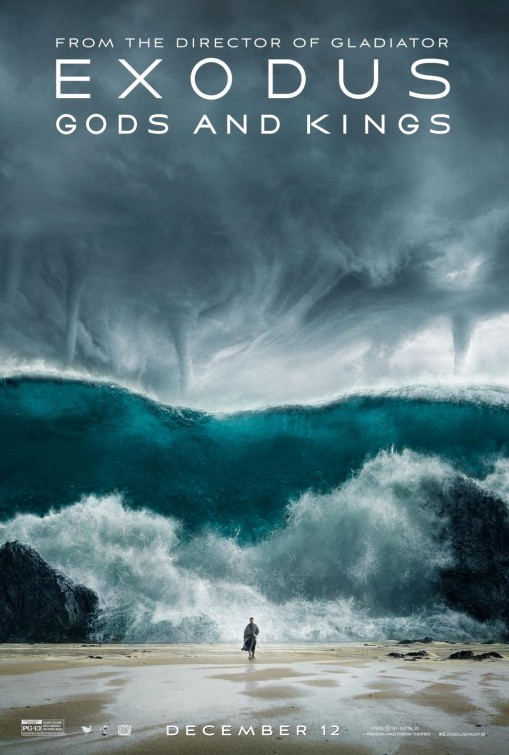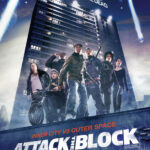Witness
Director
Ridley Scott
Starring
Christian Bale
Joel Edgerton
Sitting down to pen my thoughts on Exodus: Gods And Kings it became quickly apparent that this review was going to heavily mirror my analysis of Ridley Scott’s Robin Hood. Promising subject matter given a revisionist treatment with decent directing and wonderful production design but obscure casting and a complete lack of cohesive pacing. In truth, Mr. Scott has been in a bit of a directorial funk, punching out average releases but somehow missing the mark – but then one could argue that Scott’s career has always been a sea of ups-and-downs and it’s only a matter of time before he produces something truly exceptional in every regard. Unfortunately, this is most definitely not it.
It’s hard to know how much is worth going over in a brief synopsis. If you are unfamiliar with the biblical story of Moses, the key points to note are that the Hebrew people are slaves for the Egyptian empire and have been for the last four hundred years. While still a baby, Moses is smuggled away from his family and adopted by the Egyptian royal family and raised as one of them. When he comes of age, his true heritage is revealed and he must stand up against his effectively adoptive brother, the newly appointed ruler of Egypt, to demand the instant release of all Hebrew slaves. Moses, acting as a messenger from God, then performs several acts which torment the pharaoh and bring great suffering to his people. These plagues reach a head when the first born child of every family who has not marked their door is killed in the night. Grief stricken, the pharaoh releases the slaves, only to chase them down intent on slaughtering them all. But he and his army are wiped out after the miracle of the parting of the Red Sea is restored to normality and the waves wash away the oppressors, leading the Hebrews to settle their own community. That’s the bible version, this variant takes the above blueprints and applies several rationales to the plagues and reinterprets most of the climactic encounters into more plausible acts of guerrilla resistance.
With so much to cover and only two and a half hours of runtime, the timeline is immensely confusing; which is marked solely by the yo-yoing length of Moses’ hair and beard. But this isn’t simply limited to the passage of time from the start of the film to the end, the ambiguity even appears in small sections of key character developments. Having been banished from the palace, Moses wanders through the desert only to come across a nomadic tribe (the Kenites). A few shots later, he’s married. So, to break that down, Moses meets the Kenite nomads, introduces himself to one in particular (Zipporah, played by Maria Valverde), then he watches her weaving a rug and all of a sudden we get a wedding-and-bedding scene. It’s not even enough footage to constitute a montage! Then they have a seven or eight year old son – mercifully an on-screen subtitle informs us that nine years have passed. In truth, the whole film feels like it’s ‘rushing to get to the good bits’ and when it finally gets to the plagues, it rushes to get past them too. This leaves the entire storytelling hollow and with everyone racing from development-to-development with no time to gestate over what’s happened, there’s no actual conflict or consequence. If you haven’t seen the film, the notion of a fairly long movie about sibling rivalry, royal and political scandal, love, redemption, persecution, punishment, slavery and death being without conflict or consequence must be baffling but that’s exactly how it’s left. No doubt, as this is a Ridley Scott release, there is probably an additional hour or two’s worth of footage lying around somewhere waiting for some immense director’s cut that will improve the film tenfold but that’s not good enough. I love extended/director’s cuts but if we’re at the stage where studio interference is crippling cinema to the degree that it downgrades a good film to a subpar one, with the promise that they’ll fix it with a DVD/Blu-Ray release, we really need to start questioning whether these people have a clue as to what they’re doing – laughing to myself because I already know that studios have no fucking idea what good cinema is.
In addition to the odd pacing and lack of conflict there’s also no direct confrontation between Moses [Bale] and Ramses [Edgerton]. I know there’s a lot of underhand tension between the two (set up very early) and one scene in which Moses confesses to being a Hebrew only to reject that entirely in the next scene but outside of that there’s just a few surreptitious requests to let the Hebrews go. Moses never openly takes credit for the plagues and never explains the full terms and conditions to the consequences if he does not release the slaves immediately. Some could argue that would be because a.) Moses didn’t know the extent of God’s plan or b.) Moses suffered a head injury and he has no idea what’s going on. But that only highlights another issue. In a curious quest to sort of quantify or argue the credibility of the story from a revisionist perspective, the story of Moses leading the Hebrews out of Egypt requires even greater suspension of disbelief. As stated earlier, the script opts for a bit of a plausible, explainable, revisionist workaround for anything remotely divine or supernatural, so Moses is a bit atheistic until he suffers a head injury and starts seeing visions of a small boy who he believes to be either a messenger of or the direct voice of a single ruling god. The plagues themselves are given a “well I guess that makes sense” origin rewrite in the form of thrashing crocodiles, leading to frogs leaving the polluted water, leading to a pestilent amount of flies, which then in turn spread disease. But after that they sort of give up with the remaining three and seemingly shrug their shoulders. So the swarm of locust turn up.. just because and the blotting out of the sun isn’t even given the half-arsed eclipse bit, we just see a flash of lightning and then everything is set at night (for an indeterminate amount of time). But it’s the death of the firstborns that really kicks the audience. Without the ability to credibly argue why every single firstborn child of varying ages dies suddenly one night, unless their doorframe was marked with lamb’s blood, the story just moves quickly to the parting of the Red Sea and what it believes to be the ace up its sleeve: comet tsunami. Moses reaches the shore with a vast number of newly freed Hebrews (that I swear changes in quantity every time we see them) just as a comet crashes to the earth, sending a ripple through the sea which creates a temporary causeway – consequently followed by a thunderous and devastating tsunami wave that decimates all in its path.. sort of (see my highlighted scene below). Now, I’m not bitching as a Catholic because I genuinely hold myself to be impartial, my complaints are steeped in cinematic analysis. I have no qualms with the idea of seeing a different interpretation of this story, I just don’t feel the changes made were big or clever enough to warrant this feature being produced. No matter what your belief system, it’s distinctly easier to say a higher power brought about the plagues of Egypt than a series of well-placed coincidences. And I’m not saying, “take this route because it’s easy, established and/or unchallenging” but impartiality doesn’t benefit this film and by never picking a side between God is righteous / God is vicious, the story leaves the audience a little lost and bewildered, unsure of what exactly was accomplished.
Concerning the cast, I don’t want to give the whole skin-tone thing a great deal of credence, any more than I would in a review for the recent adaptation of Annie. I very much share the RSC mindset which implies that characters as written almost never need to be played by the ethnicity or gender that people assume they are. In my opinion, it should be the right actor for the right role – as such I think the casting of Christian Bale as Moses (rather than someone of either Egyptian or Jewish decent) is perfectly acceptable but as his personality and interpretation of the character almost constantly feels amiss, he is very much the wrong casting choice. Everyone, from the leads to the supports, to the faceless mass of extras are grossly undeveloped. So many individuals come and go with little impact on the story or the character’s emotional arc. Moses learns he is in fact of Hebrew descent and his adopted mother and genuine sister are sent into exile. Does he do anything about that? Nope, they’re just absent from two thirds of the film. Move on. The rivalry between Ramses and Moses is sown by both the deceased former pharaoh and Ramses’ mother but even then their influence seems minimal. You’ll probably notice that I haven’t actually mentioned at great length who portrays who, this is because there’s not much point going into any great detail about the supporting roles (played by John Turturro, Ben Kingsley, Sigourney Weaver and Aaron Paul) as they are completely overlooked and seem to only serve the purpose of audiences later muttering “he/she was in that?” To my mind only one actor seems to not only escape this release unscathed but gives a pleasing performance at the same time – which is why I have expanded on their presence in my highlighted character section below.
On a more positive note (as so heavily marketed in the trailers), the visual spectacle of this film is marvellous. The production design is rich and textural paralleling extremely well between the life of luxury and the commonplace squalor of the less fortunate. The sets, costumes, hair and make-up are all pooled together wonderfully and make for a very vibrant and real environment. Building on top of that, the glorious sweeping vistas and lavish computer generated effects, detailing these vast ancient kingdoms really captures a sense of wonder and might. Admittedly the score doesn’t really know what to do with itself and Alberto Iglesias’ musical accompaniment ranges from dismissive ambient filler to emotionally soaring tones which wane and rail against the visuals. It’s a very mixed bag aurally but one I would say finds itself on the more positive side of the spectrum.
All-in-all, Exodus: Gods And Kings is severely disappointing, yet people (critics, cinemagoers, etc) are generally agreeing that it was still better than Darren Aronofsky’s Noah – the other big budget Old Testament adaptation. Personally, I couldn’t disagree more. It is my belief that the liberties taken with the Noah story were bold, radical and paid off very well. It was a very mature and haunting release set in what can only be described as a different world/dimension/existence, to allow itself to say and do as it pleases. But audiences were unsure how to process this and wanted something more generic and by the book. Enter Exodus. Despite being what they supposedly want it’s labelled boring and hammy. In truth, somewhere in between Cecil B. DeMille’s The Ten Commandments and DreamWorks’ The Prince Of Egypt lies the perfect Moses adaptation but whatever Scott’s intentions, he became severely engulfed in this release and forgot all notion of how decent cinema is produced. I can only hope this means he will force his own epiphany and his next feature will excel beyond all expectation. We can but hope.
Release Date:
26th December 2014
The Scene To Look Out For:
So without the direct divine intervention angle, several of the films plot points and developments make little sense and extravagant moments are shrouded in absurdity. None more so than the heavily advertised destructive tidal wave of the Red Sea. I get the comet bit, I understand how it would create an impact chasm that would immediately affect the waterway in place, I even understand the water coming straight back and crashing through everything but what I can’t grasp is the way the wave individually selects who survives and who dies. Specifically that everyone dies except for Moses and Ramses. They are at the very centre of the causeway, riding hard, the wave has indiscriminately taken out most (if not all) of Ramses’ army and even several unfortunate Hebrews who were too close to the shoreline and the wave thunders down from 30-40 feet directly onto the two leads. After the spectacle finishes enjoying its screen time, both Moses and Ramses wash up on opposite shores alive and pretty much unscathed (bar another slight head injury for Moses). Of all the adaptations of this encounter, I’ve never seen it done as brazenly as this. Whether you want to portray a religious story or a purportedly realistic one, this is just utter nonsense.
Notable Characters:
I was going to talk about Joel Egerton and his arguably impressive performance which fleshes out a rather two dimensional character but instead the film belongs to Malak. Malak is an old Jewish word for messenger and is often interpreted to mean angel. In this case, Malak is a young boy who is either meant to be an angel or the voice of God or God itself, played by the incredibly talented Isaac Andrews. Child actors are always difficult to come by and usually fall into three categories of awkward, arrogant or adult. In other words, they’re either scared kids doing their best, upstart little shits that think they’re God’s gift or they give sardonic deliveries that sound cynical beyond their years. However, every now-and-then a child actor appears who doesn’t need to simply impersonate adult emotions and conversations but delivers them naturally – in the same way that Laurence Olivier could make Shakespeare sound contemporary and (for lack of a better word) real. Mr. Andrews is one such actor and although he only shares the screen with Christian Bale, he puts the veteran actor to shame.
Highlighted Quote:
“Is this your God; killer of children?”
In A Few Words:
“As with a lot of recent Scott releases, a lot of substance and spectacle but absolutely no soul or sincerity to the story that’s simply thrown at audiences”
Total Score: 2/5
![The Red Right Hand Movie Reviews [Matthew Stogdon]](https://reviews.theredrighthand.co.uk/wp-content/uploads/2021/12/cropped-header1.png)



